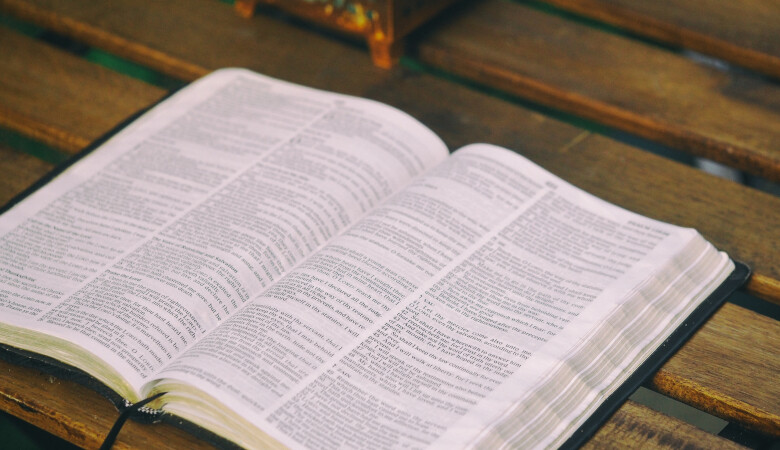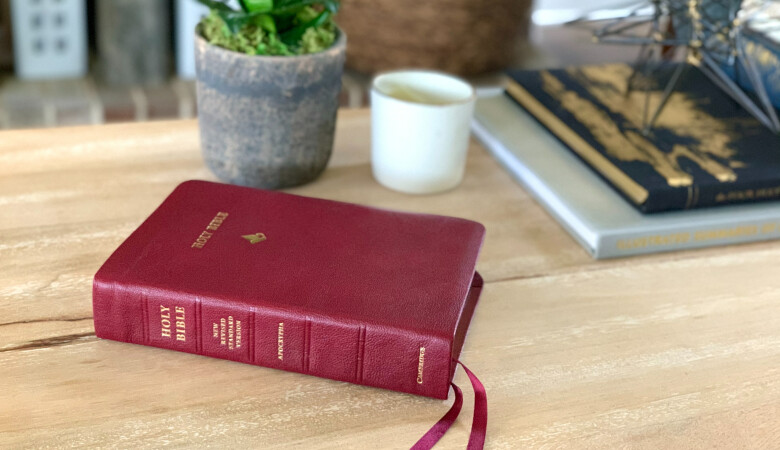Daniel's Model Prayer (Daniel Sermon 13 of 17)
March 18, 2001 | Andy Davis
Daniel 9:1-19
Prayer
I. The Mystery of Prayer
Please if you would, take your Bibles and open to Daniel 9. Today we're going to be looking at Daniel 9, 1-19. Perhaps one of the most important things I've learned in my spiritual life is the first statement as I have come to understand it in the Sermon on the Mount, "Blessed are the spiritual beggars for theirs is the Kingdom of Heaven." And the thing about being a beggar is that you ask for things all the time. You ask for everything. And so what is the language of a beggar? It's a language of need, it's a language of request, it's a language of prayer. We need to speak to God and we need to ask for him, but what kind of words shall we use? What kind of prayer does this almighty and eternal God hear?
One person thinking about prayer said, "Many a beggar has sat at the gate of Christ, mute unable to speak and received everything they needed." And so it's not so much a matter of the perfect words, but the attitude of the heart of neediness, of knowing that you're a beggar and then speaking out of that emptiness and that need to God, but yet we need to be instructed in prayer, don't we? We need to be taught how to pray. John's disciples were taught by John the Baptist how to pray. Jesus taught his disciples how to pray. We need examples how to pray, and this holy man Daniel gives us an example of prayer here in Daniel 9, verse 1-19.
Now, as we look at this, as we look at this prayer, we come face-to-face, especially in context with a mystery. Prayer is at its core, mysterious. Now, if you don't think much about it, it's not. You just ask God for things and he gives them to you, right? You make God aware of some things that he may not have been aware of, and then he adjusts his plans accordingly, right? We're starting to get in the mystery now, aren't we?
What is prayer? We are speaking to an eternal God, that we're coming to understand in the Book of Daniel, who is sovereign over all things, who is King over every king and Lord over every lord. Nations rise up at his command, and then they sink back down into the dust. The minds of kings can be turned into that of an animal, just at his will. This is the God we're addressing and as we go on in Daniel past this into Chapter 10 and 11, we're going to see a God who has everything meticulously worked out, even to kings of the North and kings of the South, moving back and forth over the Promised Land, meticulous details, worked out.
Our God is a careful planner and very attentive to detail. Do you understand now why I talk about the mystery of prayer? What is prayer and what are we doing when we come to God in prayer? What happens to us and what happens to things? Have you seen the bumper sticker, "Prayer changes things"? Does prayer change things, or does God change things through prayer? How does it work? We're into mystery here, aren't we? And I don't know that we're going to resolve at all. But we need to pattern ourselves after Daniel. Daniel came right into the throne room of God, and I believe this prayer may be one of the greatest examples of humble, broken-hearted petition, a prayer that God will answer. Prayer for the glory of his name. My charge to you is I want you to learn how to pray by following the example of Daniel. Let's look at verses 1-19 and see how he prays.
II. Context: History and Bible Study
"In the first year of Darius, son of Xerxes (a Mede by descent), who was made ruler over the Babylonian kingdom, in the first year of his reign, I, Daniel understood from the Scriptures according to the word of the Lord given to Jeremiah the prophet, that the desolation of Jerusalem would last seventy years. So I turned to the Lord God and pleaded with him in prayer and petition, in fasting and in sackcloth and ashes. I prayed to the Lord my God and confessed, O Lord, the great and awesome God, who keeps his covenant of love with all who love him and obey his commands. We have sinned and done wrong. We have been wicked and have rebelled. We have turned away from your commands and laws. We have not listened to your servants, the prophets, who spoke in your name to our kings, our princes, and our fathers and to all the people of the land. Lord, you are righteous, but this day we are covered with shame. The men of Judah, and the people of Jerusalem, and all Israel, both near and far, in all the countries where you have scattered us because of our unfaithfulness to you. O Lord, we and our kings, our princes and our fathers are covered with shame because we have sinned against You. The Lord our God is merciful and forgiving, even though we have rebelled against him. We have not obeyed the Lord, our God, or kept the laws he gave us through his servants the prophets, All Israel has transgressed your law and turned away refusing to obey you. Therefore, the curses and sworn judgments written in the Law of Moses, the servant of God, have been poured out on us because we have sinned against you. You have fulfilled the word spoken against us and against our rulers by bringing upon us great disaster. Under the whole heaven, nothing has ever been done like what has been done to Jerusalem. Just as it is written in the law of Moses, all this disaster has come upon us, yet, we have not sought the favor of the Lord our God, by turning from our sins and giving attention to your truth. The Lord did not hesitate to bring the disaster upon us, for the Lord our God is righteous in everything He does, and yet, we have not obeyed him. Now, O Lord, our God, who brought your mighty people out of Egypt with a mighty hand and who made for yourself a name that endures to this day, we have sinned and we have done wrong. O Lord, in keeping with all your righteous acts, turn away your anger and your wrath from Jerusalem, your city, your holy hill. Our sins and the iniquities of our fathers have made Jerusalem and your people, an object of scorn to all those around us. Now, our God, hear the prayers and petitions of your servant for your sake, O Lord. Look with favor on your desolate sanctuary. Give ear, O God, and hear. Open your eyes and see the desolation of the city that bears your name. We do not make requests of you because we are righteous but because of your great mercy. O Lord, listen. O Lord, forgive. O Lord, hear and act. For your sake, O my God, do not delay because your city and your people bear your name."
Now, this is a great prayer. And we can't plumb the depths of this prayer, but I hope instead to lift out some elements that may challenge you in your prayer life. Bottom line is I want you to pray like Daniel. I want you to pray like this. And so I'm going to bring out some elements to show you what I mean. But first, as always, we need to understand this in context. This prayer was uttered in a context. Something was going on in the world and in history. We Christians, we are tied into a flow of history, aren't we? Our feet are on the ground; we're not living up in the ethereal realms. We're living in a world. The world moves on with its events and those events have significance.
Frankly, brothers and sisters, if history doesn't mean anything, then your lives don't mean anything either, because history is made up of lives of people like you who went through this world and made decisions and did things. And so if history means nothing, your life means nothing, but history does mean something and so does your life. Every action, every word has significance. And we are people who are connected into a history and into a flow, and it's going on around us at all times. And so also was Daniel and so is this prayer. It's rooted in events. Something was going on. It was the first year of Darius, son of Xerxes, a Mede by descent.
Well, what was going on? Well, Babylon the great had fallen. The Babylonian Empire was no more. A new empire had come to take its place, the Medo-Persian Empire. Miraculously, Daniel, who had been third highest in the Babylonian kingdom, was made third highest in the Medo-Persian Empire as well. Only God can do that. And yet Daniel understood the significance of the times. He knew why he was in Babylon. He was a Jew, one of God's chosen people. And God had brought his chosen people with a mighty hand and an outstretched arm, into a Promised Land and had given them that land on condition. There were conditions to the land. They had to obey God's commandments, and God sent prophets and warned them that if they didn't obey that they would be expelled from the land. They didn't listen to the prophets and they were expelled and Daniel was among them. He was expelled from the Promised Land and went to Babylon, and there he lived out his life.
Well, now it's the first year of Darius. Now Darius was co-ruler, I believe, with Cyrus the Great. Cyrus the Great was the conqueror that took over all that land, and I believe Darius was made in charge of Babylon and the former Babylonian Empire in that region. But Cyrus the Great, I believe, was the great king, the ruler over all. That's why whenever you have images in the book of Daniel, of the Medo-Persian Empire, you have two horns but one is longer than the other; the Persians really had the upper hand. Cyrus the Great was the true ruler. Darius was a Mede by descent, and I think he ruled under Cyrus the Great.
Daniel’s Devotional Life
But now, here in this chapter, in the midst of these historical events, we are going to get a glimpse into Daniel's devotional life. We're going to be ushered right into his prayer life. We're going to see how he prays. We're going to learn his heart. We're going to get a glimpse into Daniel's devotional life. Daniel was a man of prayer, wasn't he? We already learned that in chapter 6, the lions' den chapter, you remember? Three times a day, he got down on his knees and prayed, giving thanks to his God just as he had done before. Daniel 6:10, three times a day.
He was a man of prayer, but he was also a man of intensive careful Bible study. What a beautiful combination. That's a devotion. Reading the Bible and prayer. That's a devotion. I hope you do it every day. Take in some Bible, read it, meditate on it, think about it, let it change your heart, and then return it back to God in prayer. That's a devotional. And Daniel had devotions, he had lots of them, three times a day. He was a man of careful Bible study. Look what he says, "I, Daniel, understood [literally] from the books or from the Scriptures, according to the word of the Lord given to Jeremiah, the prophet." Stop right there.
Now, if you want to read the words of the Book of Jeremiah, the prophet, what do you do? Well, you reach for one of your seven or eight Bibles, take it off the shelf, open it up, flip to page whatever it is, and begin to read. But it wasn't so easy for Daniel. When had Jeremiah, the prophet, written his words? In Daniel's lifetime. They may well have met each other; they may have been friends even. Two godly people, like Jeremiah and Daniel. Jeremiah, at that point, an old man, a prophet. Jeremiah, a very young man, maybe a teenager on his... I mean, Daniel, on his way to exile to Babylon. Maybe their paths crossed, we don't know; we can't speculate but we do know at some point, he got hold of a scroll, the words of Jeremiah the prophet. Realize they didn't have Xerox machines, they didn't have printers, they didn't have Microsoft Word, or any of these kinds of things that we have today.
What did they have? They had scrolls and they had pens and ink and Jeremiah wrote down his words on a scroll and somehow it was Daniel that got hold of it. Isn't that incredible? God got it to the right man, and my guess is he began copying that thing. Just like Baruch had done earlier, so that there would be more than one, so that you people could reach for one of your seven or eight Bibles, open it up and read it. Praise God for Daniel. But he was writing down, I believe, copying, but more than anything, he was reading and thinking and understanding. It's the way the Scripture is. You need to think about what you're reading, or it has no impact on you. And so he's thinking, and he's understanding, he says.
Jeremiah’s Words Vindicated: The Time Frame Revealed
And Jeremiah's words, it turns out, are being vindicated in history. The prophecy given by Jeremiah was being vindicated in history. Now who is Jeremiah? Well, Jeremiah was a very unpopular man. He was a prophet. And while Nebuchadnezzar and the Babylonian army surrounded the walls of Jerusalem in fulfillment to the warning that God had given, centuries before through Moses, the Babylonians coming as a scourge and a discipline to the Jewish people inside the walls of that city holding out.
That city holding out against Nebuchadnezzar, was a man Jeremiah who said, "I would recommend that you open the gates and let him in because God has sent him. And if you yield to him at this point, God will preserve the city, but if you fight, the city will be destroyed and you will die." Was that a popular message? Absolutely not. And not only was it unpopular, it was viscerally hated by most of the people inside the city, and so also was Jeremiah. And so Jeremiah was arrested, he was thrown into the bottom of a well, muddy well; he was despised and rejected. He was hated, but he spoke the truth. He spoke the truth and he wrote the truth too, didn't he? He wrote down all of his prophecies, he wrote them down, the predictions that Nebuchadnezzar would destroy the city, that the people would be sent into exile. He wrote them all down. And the king of the city, before the city fell, Zedekiah got hold of that scroll and sat down in front of a fire pot to warm himself. You know the story. He's warming himself while the scroll is read, and he's got a knife in his hand. And as a line of Jeremiah's prophecy was read, he'd cut off a portion of it and burn it, keep the fire going.
Can you imagine? Isaiah 66:2. "This is the one I esteem: He who is humble and contrite in spirit, and who trembles at my word." Not somebody who cuts it up and throws it into a fire pot. Well, he didn't tremble at God's Words, Zedekiah. And so the whole scroll get burned in that fashion, and so Jeremiah wrote it again, every word of it true. Now among those prophecies was a clear prediction as to how long the exile would last; it would be 70 years. Now, how in the world can God know that? Well, God knows all things. He knows the end from the beginning, he's the Alpha and the Omega, not just the Alpha. He knows all things and so he told Jeremiah to write down, this is what he says: Jeremiah 25:11 and following, "This whole country will become a desolate wasteland. And these surrounding nations will serve the King of Babylon seventy years. But when the seventy years are fulfilled, I will punish the King of Babylon and his nation, the land of the Babylonians for their guilt, declares the Lord and I will make it desolate forever." Clear prediction, 70 years.
Gets even clearer in chapter 29 of Jeremiah, 29:10. "This is what the Lord says…" and by the way, in these words, you'll hear a very famous verse that many people quote as their life verse. So, understand it now in context. Jeremiah 29:10 and following. "This is what the Lord says. 'When seventy years are completed for Babylon, I will come to you and fulfill my gracious promise to bring you back to this place. For I know the plans I have for you, declares the Lord. [Sound familiar?] Plans to prosper you and not to harm you, plans to give you a hope and a future. Then you will call upon me and come and pray to me, and I will listen to you. You will seek me and find me, when you seek me with all your heart. I will be found by you, declares the Lord, and I will bring you back from captivity. I will gather you from all the nations and places where I have banished you, declares the Lord, and bring you back to the place from which I carried you into exile." Those are the plans that God has, plans to prosper the Jewish nation, and to bring them back from their place of exile.
But in the middle of that is a prediction that there would be somebody or some group of people that would pray and ask him to do it. "You will seek me and you'll find me and you will ask and I will answer." And who would that be? Daniel. And maybe some others. God raised up Daniel. And so he's reading Jeremiah's scroll and he begins to calculate. Let me see, it's 605 BC. It's been about 67 years from the beginning. 586 BC is when the temple was destroyed. For your information, 71 years later, the temple was rededicated. God has it perfect, the beginning and the end, 70 years, just perfect. But it's been 67 years now at this point, Cyrus the Great, he's measuring it out, said, it's getting near. "God I don't know your timing. I don't know exactly when it began, but it's time to pray, it's time to pray." And he got down on his knees and he started to pray.
Isaiah’s Stunning Contribution: A Specific Name
Now along with this comes a stunning contribution from Isaiah the prophet. 200 years before this, Isaiah had made a prediction as well concerning the restoration back to Jerusalem. Now, I have to believe that if Daniel had Jeremiah, he also had Isaiah. Doesn't say so, but I'm going to read it to you anyway. God, with perfect clarity, wrote down the name of the king of Persia who would send them back, and his name was Cyrus.
Are you amazed? 200 years ahead of time, he got the name right. Take one of your seven or eight Bibles this afternoon and pull it off the shelf and open up to Isaiah 44:28 and following and understand that the words you're reading were written 200 years before Cyrus was born. "Who says of Cyrus, 'he is my shepherd and will accomplish all that I please; He will say of Jerusalem, "let it be rebuilt, and of the temple, let its foundations be laid."' This is what the Lord says to his anointed, to Cyrus, who's right hand I take hold of to subdue the nations before him." Cyrus would come and conquer, and he would allow his people to go back and rebuild the land. Cyrus, hmm. Well, history follows prophecy. Cyrus the Great did come; he rampaged, he conquered, he's in charge now. And it's not going to be long before these things are going to be fulfilled, but first, there's a godly man who does what? He prays for it. Gets down on his knees and prayed.
Daniel is passionately motivated to pray; look what he says. "I Daniel, understood from the Scriptures, according to the word of the Lord given to Jeremiah the prophet that the desolation of Jerusalem would last seventy years, so I turned to the Lord God and pleaded with him in prayer, and petition, and fasting, and sackcloth and ashes." Verse 3. The first word is, "So" or "therefore." Because of what I was reading in Scripture, I prayed. Is that not beautiful?
Listen to what Calvin says about this, this is not motivation to laziness but to passionate prayer, this is what Calvin said, "The faithful do not so surrender in the promises of God as to grow lazy, and become idle and slothful through the certainty of their persuasion that God will perform His promises, but are rather stimulated to prayer. For the true proof of faith is the assurance when we pray that God will really perform what He has promised us."
Do you see that? It's not a motivation to laziness. Well, seventy years I guess, you're going to do it. I'm just going to kick back and relax, let you do it. Sit in that rocking chair, God, you're sovereign over all things. Absolutely not. He got on his knees and asked him to do the thing He had promised to do. That is godly prayer.
III. Daniel’s Preparation for Prayer (vs. 3-4)
And that's what Daniel does. Now first, he prepares himself to do it. And this is so vital that we prepare ourselves to come into the presence of God. I try to do it just by pausing a little bit and remembering who it is I'm about to speak to. But Daniel goes far deeper than that with thorough preparation. First Daniel is prepared for this prayer daily and for years. He's prepared daily and for years. With his daily prayer life; three times a day, he got down on his knees and prayed. Day after day, and through daily personal holiness. Prayer is deeply hindered by sin habits and worldliness. Listen to what John Bunyan said about this. John Bunyan, who wrote Pilgrim's Progress, he said "Prayer will make men cease from sin, or sin will entice a man to cease from prayer." There's a battle going on in your life between prayer and sin. Who's winning right now? Who's winning? Prayer will entice you to stop praying. 1 Peter 4:7 says it this way, "The end of all things is near; therefore be clear-minded and self-controlled so that you can pray."
You kind of need to earn prayer almost; you need to be holy and pure, self-controlled, disciplined, because if you're not, you will not be able to pray, and all of us can testify to that. You can't pray when you're in sin. So he's prepared through holiness. William Gurnall said this. "When people do not pay attention to what God speaks to them in his word, God will pay as little attention to what they say to him in prayer."
You see that? If we listen to what God is speaking to us and live it out in obedience he will hear our prayers, but if not, he will not listen to that which we speak to him in prayer. And so Daniel was prepared through 90 years or so of walking with God and he's prepared also by the Word of God; he's daily immersed in the Scripture and therefore he's praying according to God's will. We know if we pray according to God's will, he hears us.
Prepared by the Word of God
Well, how do you know what God's will is? Well, he's told us in Scripture. He's immersed in it. He's just saturated in the Word of God. And the word alone has a record of God's promises and the promises are the basis of our prayers. Are they not? Things that God has said he's going to do, that's what we pray back to him. John Trap said, "Prayer is putting the promises of God into clothing." Isn't that great? Prayer is putting the promises of God into clothing. Clothing the promises of God. Thomas Manton said, "One way to get comfort is to plead the promises of God in prayer." I love this, "Show him his handwriting; God is tender of his Word."
So "Lord God, it says right here in Jeremiah, that seventy years you're going to restore, so here's your handwriting. You've written it, you signed it, please do it." Show him his handwriting, he delights in his word." We are not at liberty to make up our own requests.
I spent a summer in the summer of 1983, in New Hampshire; we were doing beach evangelism, witnessing, and just having ministry. It was a wonderful summer. But you could stand on the beach, of Hampton Beach, New Hampshire and you could look just south, right over the border into Massachusetts and there you could see this kind of smooth concrete dome and some interesting smoke stacks coming up. It was the Seabrook Nuclear Power Plant. It was the site of many protests when I was growing up. I always protest against nuclear power, but that provided power generation for that entire region of New England, a powerful plant.
How NOT to Pray
Now, what I try to want to get at here is a false understanding of prayer. Suppose your father were in charge of the Seabrook Nuclear Power Plant, and you were 10 years old. And your father wanted to just involve you in his life and brought you right into the control room of the nuclear power plant. And all these lights and knobs and switches and buttons. It's amazing. And he said, "Listen, I'm going to leave and I'm going to go get us lunch, you stay in here for an hour and just do anything you want to do. Don't worry about anything. If you start hearing some sirens, they're going to be loud, but don't worry about it, just have a good time. And I'll be back in an hour with lunch, and then we'll take it from there." And that is some people's model of prayer, although they know it not, that God surrenders control of the universe to us and says "Look, whatever you want to do, just do it; if you ask enough, I'll let you do it." And then suddenly the universe goes careening out of control.
Not at all. Rather, it's kind of this way; it's kind of like we're out in a boat and we throw some grappling hooks on the shore and pull the shore to us. You see. The shore is getting ever closer to us. Is the shore moving? No. It seems like it is, getting ever closer and closer but the shore's where it always was. What's moving? We are moving toward the shore. Do we need to move?
Absolutely, absolutely. We start so far from God. We don't care about God, or his purposes and we don't care about other people. We don't love God with our heart, soul, mind, and strength, and we don't love our neighbors as ourselves. And what changes that? The blood of Jesus Christ and prayer and other things. Transformation, so that we start to care about what God is doing in this world and the shore gets ever closer to us all the time. Closer and closer, through prayer. God is not going to surrender the control of the nuclear power plant to us for even a moment. You know why, because he loves us too much to do it. He knows what he's doing. And so we're going to pray God's will.
Prepared by Extraordinary Humbling
And so, Daniel is prepared by saturation in the Word of God and by extraordinary humbling, and what is his means of humbling? Fasting, sackcloth and ashes. Is this to get God's attention? No. It's to get Daniel's attention. You understand that? God is attentive. Remember, a day is like a 1000 years; he's all over the things we do, he's attentive. But the humbling and the fasting is to make us serious about what we're praying for.
No amount of fasting or sackcloth wearing will ever get God's attention, in view of sin or life of sin. Augustus Toplady knew this. In his hymn, Rock of Ages, he said, "Not the labors of my hands can fulfill thy law's demands. Could my zeal no respite know, could my tears forever flow. All for sin could not atone. Thou must save, and Thou alone." So it doesn't matter how hard you come to God, in fasting and prayer and sackcloth and all, we only come in the name of Jesus Christ and his blood. Isn't that true? It is true; we come in the name of the blood of Jesus Christ. Covered with his righteousness.
But the fasting and the prayer makes us serious. It's a way of showing seriousness about the prayer and also way of showing grief over sin. There's a mourning over sin, and Daniel is going to do it, isn't he? He's grieved over the sin of his own life and that of his people. And then he prepares by turning to God, verse 3, it says "I set my face to the Lord my God to seek him."
Daniel turned his face total concentration on the Lord. God was all he wanted; the will of God was all he wanted. In Daniel 6, he prayed towards Jerusalem and he's focused also on Jerusalem and on the people of God. Why? Because God cares about Jerusalem. God has a plan and a purpose for Jerusalem, so he zeroed in on what God wants. And then he prepares himself finally by words of awe, by words of awe, speaking glorious words to God. "O Lord, the great and awesome God who keeps his covenant of love with all who love him and obey his commands." He's setting his mind to this awesome God. To whom are you speaking, to whom are you speaking? The God who set the ends of the heaven up and filled with more stars than you can count. The God who set the sun in the center of the solar system has kept it burning all this time with more energy than you can measure. The God who knit you together in your mother's womb. That's who you're talking to. So with words of awe he prepares himself.
IV. Daniel’s Deep Confession (vs. 5-14)
And then in verses 5-14, he gives himself to confession of sin. Daniel is deeply probing himself and his people. He's looking for sin, and he wants to bring it up out and confess it to God. No light dealing here with sin. We're going to get deep here. When I was 12 years old, I was... I invited some friends over, and around the time that they were about to come, I started to suffer for some abdominal pain, some serious stomach-ache. I didn't want to tell my parents because if I told them they'd make my friends go home.
So I didn't say anything. And I spent a terrible night in agony, all night long, in terrible pain. The next morning, I could barely do anything. My parents went off to various things; my dad went to work, my mom to do some things and I was left after my friends left laying on the couch, literally dying from appendicitis. Literally. My mother came back earlier than she had expected, to save my life, though she knew it not. Brought me to the hospital, the doctor said "Well, it's probably appendicitis. It would probably be about an hour operation, maybe a little less." Problem was that it was acute appendicitis, and it burst on the operating table. So I was on the table for four hours or more.
Now, the point is, unless you get all the contagion out, the life is threatened; unless you get all the contagion out, the life is threatened. And so, Daniel was very thorough in his confession of sin. And so also, should we be. We're too light, too quick on this matter, aren't we? We move on too quickly. So Daniel deeply confesses.
Central Issue: Rebellion against God’s Word (vs. 5-6, 10-13)
And what is the issue? In Verses 5-6 and 10-13, the issue is rebellion against God's Word. Rebellion against the prophets. God had agreed to speak to the people, not directly with his own mouth, but through prophets. He would put his words into the mouth of human beings, and yet Israel did not listen to the prophets, did they?
What did Jesus say in Matthew 23:37, "O Jerusalem, Jerusalem, you who stone the prophets and kill those sent to you. How often I have longed to gather you together." And worse than not listening to the prophets or disobeying them, Israel broke the covenant, the very agreement that God had given generation after generation. And so, Daniel lifts up a contrast. We O God, we have broken the covenant; you O Lord, you have kept it. We have been wicked, you have been righteous. We have been faithless, you have been faithful."
In Verse 9, "The Lord our God is a merciful and forgiving God, even though we have rebelled against him," the contrast. And then finally, in verses 11-14, he speaks of the curses, the Mosaic curses which came true. "God, you said it would happen. You said you would bring curses on us, that you would expel us from the land and now, O God in perfect faithfulness you have done the thing you threatened."
In Deuteronomy 28, it says, this is the words of Moses a thousand years before it happened, "Just as it pleased the Lord to make you prosper and increase in number, so it will please him to ruin and destroy you. You will be uprooted from the land you are entering to possess. Then the Lord will scatter you among all nations from one end of the earth to the other. Then you will worship other gods, gods of wood and stone, which you neither or your fathers have known. Among those nations, you will find no repose, no resting place for the sole of your foot. There, the Lord will give you an anxious mind, eyes weary with longing and a despairing heart; you will live in constant suspense, filled with dread, both night and day, never sure of your life. In the morning, you will say, 'If only it were evening' and in the evening, 'if only it were morning.'" God predicted all of this ahead of time, and in perfect faithfulness after much waiting for our God is a patient God, slow to anger, finally, the judgement came through Nebuchadnezzar and the Babylonians, but it's been measured out seventy years.
God, you did what you promised. You did what you promised and brought judgment on us. And so Jerusalem is a scourge to the nations, but now in verses 15-19, he turns the whole thing around, it's amazing. He is saying, "Just as you were faithful to bring the judgment on us, so now O God be faithful to restore us." Do you see how it works? Our God is a perfectly faithful God, faithful to bring the judgment, faithful to bring the restoration. And so he's pleading with God based on his faithfulness.
V. Daniel’s Faith-filled Petition (vs. 15-19)
Look what he says, verses 15 and following, he says, "Now O Lord, our God, who brought your people out of Egypt, with a mighty hand and who made for yourself a name that endures to this day. We have sinned and done wrong. O Lord in keeping with all your righteous acts, turn away your anger and your wrath from Jerusalem." You see? In keeping with your faithfulness, in the exact same character trait of faithfulness, now God, turn away your wrath and restore us back to Jerusalem. See how it works? He's pleading the character of God.
He makes a petition and understand the ground of his petition is God's zeal for the glory of his own name. Isn't it? "God, you do all things for the glory of your name. You chose out the people for the glory of your name, You brought them into Egypt for the glory of your name. You were patient with them for the glory of your name. You judged them for the glory of your name, and now, O God, for the glory of your name, restore them back to Jerusalem. Turn your wrath away." And so, Daniel's motivation is God's zeal for the glory of his name. For Your sake, O God, do it, not because we're righteous, not because we're Godly, but for your sake and for your name.
Now, why does Daniel pray like this? And why is God so intensely concerned with his own name? Understand this, that the proclamation of the name of God means salvation for people. Isn't that true? As we proclaim a glorious mighty God who revealed himself in Jesus Christ, who did miracles and who sent his Son Jesus who died on the cross and was raised from the dead on the third day, as we proclaim a God, the name of that God, what happens? People call on the name of that God. And what happens when they call on the name of the Lord? Well, they're saved. And so, Daniel restoring it over and over, praise for God's glory and for his reputation, not for Israel's righteousness.
VI. Lesson and Applications: Pray Like Daniel!
Now what applications can we take from this as we look at Daniel 9. I guess, simply this. I want you to pray like Daniel. First of all, proper preparation and passion. Cold prayers freeze before they get to heaven. Do you understand that? They freeze before they make it. They never get there. Heat your heart up. Heat your heart up at the Word of God and with the Holy Spirit. Proper preparation and passion, the right emotion, the right knowledge of the Word of God, seriousness and humility in your spirit, saturation in the Word of God, fear of the Lord. These things prepare you for prayer.
Secondly, confession of sin. Don't come swaggering into God's presence based on your own righteousness. You have none. Come humbly as a spiritual beggar clothed with the righteousness that was given you as a gift, the righteousness of Jesus Christ, and then confess your sin. Search your heart and your mind. And may I suggest that you be like Daniel. Daniel confessed not only his own sinfulness but the sinfulness of his what? His people. Do we have things to confess on that score? Are we people of unclean lips, who live among a people of unclean lips? Can we not confess the sins of America as though they are very own? Are we so different from our neighbors in the things we read in the newspaper or see on television, we could never do those things? Can we not confess the sins of our own people the way that Daniel confessed the sins of the Jews?
And thirdly, prayer according to God's will, informed by God's Word. Don't think for a moment that God's going to let you into the control room of a nuclear power plant. Don't want him to do so. Don't trust yourself so much. Let God be God and let his will rule. Instead, say, "God, what is your will in this matter? What are you doing in the world and how can I pray in accordance with that?" And the only way to do that is saturation in the Word of God.
And finally, pray for the glory of God's name. May I suggest, do everything for the glory of God's name. Whether you eat or drink or whatever you do, do it all that God's reputation may shine brightly around you and in the world. And why? So that people can be saved; for everyone who calls on the name of the Lord will be saved. Won't you close with me in prayer?

















